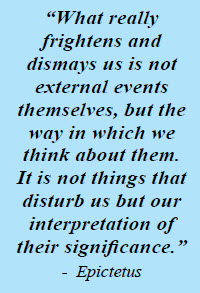Irrational vs. Rational Thinking
 By: Lisa Philippart
By: Lisa Philippart
There are many ways to interpret the events in your daily life. But, how can you know which perceptions are reasonable and which ones tend to be determined inaccurately? The best place to start is by learning about and recognizing our irrational thinking. Why start with the problem thoughts? Because in order to distinguish rational thinking from just positive thinking, we need to first uncover and dispute our irrational thought patterns; otherwise these thoughts remain, and no amount of “happy thoughts” will eliminate them. An irrational belief is one that distorts reality. It is a misinterpretation of what is happening, often based on some illogical way of evaluating one’s self, others, or the world. As you might imagine, this type of thinking can create extreme emotions, which if left to persist, become distressing and immobilizing. This leads to harmful behaviors which will eventually block you from achieving your goals and discovering your purpose.
Turning your thoughts around means reframing an irrational thought into a rational thought. (Easier said than done, I know!) Let me give you some examples from statements I have heard from clients:

Let me suggest that you eliminate one word from your vocabulary that will have a life-changing effect. Stop using the word “should.” Quit “shoulding” yourself! This basically means that you are creating pressure on yourself to do or be something (or someone else should do or be something) based on how you think it ought to be.
Dr. Albert Ellis, a clinical psychologist, who is the founder of Rational Emotive Behavior Therapy (REBT), proposes that a small number of core beliefs underlie most unhelpful emotions and behaviors. Here is a sampling of the most common/universal irrational beliefs:

I need love and approval from those who are important to me.
People “should” always do the right thing. If they don’t, they must be blamed or punished.

I must worry about bad things so they don’t happen.
Do you see yourself in any or all of these statements? Everyone has a set of rules to live by. Some are rational, others resemble the beliefs listed above. Each person’s set is different. Mostly subconsciously, the rules we hold for ourselves determine how we react to life. Here’s how this irrational belief process works in your mind: “To be worthwhile, I must succeed at everything I do.” You fail an exam. It then follows that, “I am not worthwhile.” Underlying rules are also generalized, meaning that one rule can apply to many situations.
Why be concerned about your rules? While most rules of living tend to be valid and helpful, some will be irrational. Faulty rules lead to faulty conclusions. Take a moment now to examine some of your rules of living. Are they helping you to work toward your best self?
By: Lisa Philippart
Licensed Professional Counselor